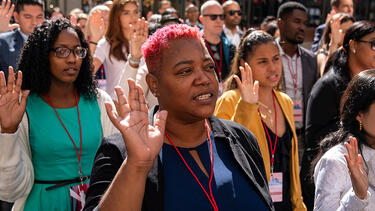Don’t Use COVID-19 as an Excuse to Turn Away Skilled Immigrants
The Trump administration is reportedly planning to limit immigration for skilled workers in order to boost employment for domestic workers. Yale SOM’s Jeffrey Sonnenfeld writes that such a move would stifle innovation and even endanger Americans’ health.

New U.S. citizens recite the the Oath of Allegiance during a naturalization ceremony at Rockefeller Center in New York City in September 2019. Photo: Drew Angerer/Getty Images.
This article originally appeared in Fortune.
Memorial Day is an excellent opportunity to celebrate the contributions immigrants have made to America. However, worrying news has emerged that the Trump administration plans to limit highly skilled immigration in an attempt to goose employment.
Such a policy shift would not only be deleterious to our nation, but an ill-founded solution to spiraling unemployment.
From the earliest days of the republic, immigrants have been vital to our national identity. Apple pie, the song “God Bless America,” hot dogs, and hamburgers are products of immigrants, and immigrants played a part in founding iconic American companies like Intel, Google, Tesla, and Uber. But now, the administration and some lawmakers are using the coronavirus crisis as an excuse to tear down programs that have helped bring talented workers and students to the U.S., where they are crucial contributors to our economy.
The two most prominent programs being targeted are H-1B visas and Optional Practical Training, or OPT. H-1B visas allow U.S. employers to temporarily hire foreign workers in occupations that require specialized knowledge and skills, with stays ranging from three to six years. OPT allows foreigners with student visas to work in the U.S. following graduation for periods between one and three years, depending on their field of study.
Restricting these programs could have an enormous impact on the tech and engineering fields. Many leading U.S. companies were founded by immigrants and depend upon these programs to employ talented international students and workers. About 18% of the entire labor force is foreign-born, with one in four STEM workers being an immigrant, according to an American Immigration Council analysis of American Community Survey data.
Furthermore, more than half of startups with revenues of $1 billion or higher have immigrant founders or co-founders, according to a National Foundation for American Policy study. And immigrants or children of immigrants are responsible for founding or co-founding 45% of 2019’s Fortune 500 companies, per New American Economy.
International students, who make up over 5% of American university students with more than 1 million studying here, contributed about $45 billion to the U.S. economy in 2018, according to the Institute of International Education.
Our healthcare system will also be at risk from a policy change. The pandemic has highlighted the role of healthcare workers in our society; limits on highly skilled immigration could have fatal consequences for Americans.
Colleges are already fearing the impact of COVID-19 on enrollments and endowments; we are simply not in a financial position to reject qualified students who dream of studying and working in our nation.
To be sure, some schools operate as irresponsible “visa mills” that trade a substandard education for work opportunities in the U.S. But that problem can be solved by not extending H-1B and OPT authorization to students from those colleges and universities.
COVID-19 has had a devastating impact on all of us, but this crisis should not be used as an excuse to allow xenophobia to stifle our future growth. The U.S. has been and always should be a nation of immigrants. Now more than ever, we must remember the importance of immigration, which has fueled technological ingenuity and economic productivity for our entire history, shaping America’s character as a symbol of freedom and innovation.
Welcoming highly skilled and talented foreign students and workers is our best path to promoting employment of native-born Americans. We need great minds from all corners of the world to preserve America’s technological prowess, social diversity, and economic vitality. Preserving the H-1B and OPT programs will benefit us all.